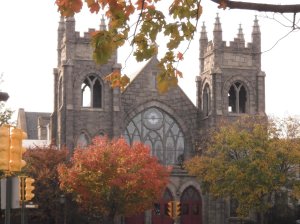I’ve mentioned a few times that I have two goals for my church, but I’ve never laid out exactly what they are in this series. If you’ve been a reader for a while, you probably already know what they are, but I’d figure I’d spell it out.
- I want my church to openly and honestly declare that they support women.
- I want my church to approach the reality of abuse with abuse victims in mind.
Those two goals encompass a huge set of changes– and I’m only positive about a few of them in the short-term. This is going to be an extended process if it happens at all, and I’m trying to keep myself realistic. I can’t expect sweeping changes overnight, and the only thing that will ensure is that I burn myself out much faster than anything can happen.
I am working on articulating– to myself, and to others– what I would like these changes to be, specifically. What I do know, right now, is that it’s not really a set of policies I want to put in place. What I want to see happen is a fundamental shift in how this church treats women and abuse victims.
One of the problems is that this church, just like other denominations that claim to “be supportive of women,” doesn’t distinguish between women can lead and women should lead. It might seem subtle, but it’s not.
The difference comes down to recognizing the absolute necessity of having women involved in leadership, and not just saying “oh, if you want to.” This church is in a strange middle place of having women in leadership– on the staff, on volunteer teams, as teachers– but not allowing women to serve on the elder board. With one half of their mouth they claim that they “support women” and say they think that women “can be leaders,” but with the other half they say that they do not support women and that they can’t be leaders.
My partner and I have gotten a multi-pronged reason for why the church was set up this way, and the reasons have varied according to who we spoke to. One of the staff mentioned that it was because our founding church didn’t have women on the elder board, so when they appointed our elder board (the elder board is self-appointing and not elected, because the church doesn’t have a member role), they just didn’t appoint women and it’s stayed that way. Another suggested it was because that the elder board is itself split on this issue, so they haven’t been pro-active. One of the pastors explained that they believe in the “biblical approach” (read: complementarian), but that they’ve “allowed” women to serve in other positions, just not the elder board.
However, the official reason I’ve gotten from the elder board and the senior pastor was that they believe this position is a “compromise” regarding a contentious issue. Obviously, I disagree that this is a “compromise” at all, but that’s what I am going to be arguing for when I meet the elder board. Initially, I’m going to be asking that the elder board change their position and allow women to serve, but my real goal is for the elder board to be representative of the church– so somewhere around half of them being women. This comes from my desire to see this church not just “allow” a woman to lead, but to seek, encourage, and train women to be leaders— something that men have gotten in evangelical churches for years. They do this to a limited extent, but I want to see a shift happen. This church, as I’ve explained, went out of their way to be racially diverse– they thought that was important enough to actively pursue. I want that same attitude reflected in how they treat women: important enough to pursue.
For the second goal, I want to make it clear that this church hasn’t been antagonistic toward abuse victims. I’ve seen many churches over the years be openly dismissive of abuse victim’s needs, and I’ve heard horror stories about how “church should not be safe”– from multiple people in different denominations, different areas of the country. It can get so much worse than that, too– churches and church leaderships can engage in massive cover-ups that can go on for thirty years or more.
To be honest, I’m not entirely sure about this church’s stance toward abuse victims. All I know is that, as an abuse victim sitting in a Sunday morning service, I’ve been hurt, and I’ve heard things that I know perpetuate and legitimize abuse for abusers and their victims. However, I think all of that is done because of innocence, and what this church needs is education. It’s an extremely difficult thing to face, standing in front of a congregation, knowing that 20% of the marriages you’re seeing are abusive, that 25% of the women and 10% of the men have been raped, that 40% of the people were abused as children, that half of those were also sexually abused. It’s not a reality that I’d want to face every week as a pastor.
But it has to be faced.
It has to be because the abuse is ongoing, because pastors preach to abusers and their victims every week. They are speaking into the hearts of wounded people– people who probably don’t even know that they’re being abused.
And churches, pastors, leaders, they don’t know what to do. They don’t know how what they say can be manipulated by an abuser to give them even more power. They don’t understand how abusers work– how they are actually attracted to church because they know we’ll give them a multitude of second chances, and extend grace and forgiveness and compassion.
These are the things I want to see change.

